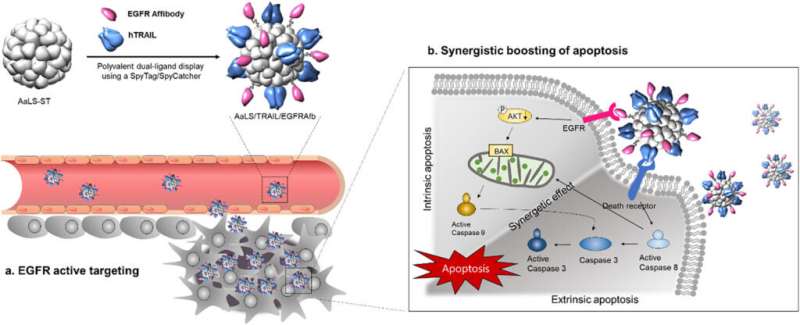New protein-based nanocomposite synergistically suppresses tumor growth

A research team, affiliated with UNIST has unveiled a new substance that inhibits cancer growth by inducing apoptosis in cancer cells.
This breakthrough has been carried out by Professor Changwook Lee and his research team in the Department of Biological Sciences at UNIST. In this study, the research team reported a new type of protein-based nanocomposite that dramatically enhances the in vivo efficacy of the TNF-related apoptosis-inducing ligand (TRAIL), a promising anticancer drug candidate known for the treatment of many cancers.
In this study, a lumazine synthase protein cage nanoparticle isolated from Aquifex aeolicus (AaLS) was used as a multiple ligand-displaying nanoplatform to display polyvalently both TRAIL and EGFR binding affibody molecules (EGFRAfb) via a SpyTag/SpyCatcher protein-ligation system, to form AaLS/TRAIL/EGFRAfb.
According to the research team, "the AaLS/TRAIL/EGFRAfb efficiently disrupted the EGF-mediated EGFR survival signaling pathway by blocking EGF/EGFR binding and strongly activating both the extrinsic and intrinsic apoptotic pathways, to maximize apoptotic cancer cell death."
In addition to using an A431 tumor-bearing mouse model and NIR in vivo imaging, the research team also demonstrated the EGFRAfb-mediated active targeting and subsequent accumulation of AaLS/TRAIL/EGFRAfb at the tumor sites in vivo, successfully. Indeed, the A431 tumor-bearing mice treated with AaLS/TRAIL/EGFRAfb exhibited a noticeable suppression of the tumor growth without any significant side effects, according to the research team.
"Our findings suggest that AaLS/TRAIL/EGFRAfb could be used as an effective protein-based therapeutic for EGFR-positive cancers, which are difficult to manage using mono-therapeutic approaches," said the research team. "[T]he versatile AaLS-based nanoplatforms may offer an opportunity to develop novel therapeutic platforms for carrying multiple protein-based ligands and modulators."
This study was published in the July 2022 issue of the Journal of Controlled Release.
More information: Heejin Jun et al, TRAIL & EGFR affibody dual-display on a protein nanoparticle synergistically suppresses tumor growth, Journal of Controlled Release (2022). DOI: 10.1016/j.jconrel.2022.07.004
Journal information: Journal of Controlled Release





















